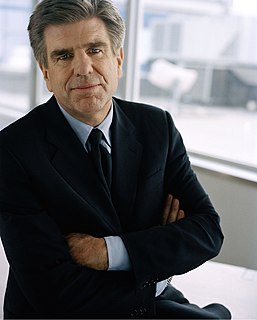A Quote by Michael Josephson
There are two sure ways to fail: never get started and quit before you succeed. Many companies promote the language of risk-taking and innovation but are so concerned with short term profit goals that their culture discourages innovation (trying new things) and abandons promising projects too soon. It shouldn't require exceptional moral courage to try new things and stick with them.
Quote Topics
Before
Companies
Concerned
Courage
Culture
Exceptional
Fail
Get
Goals
Innovation
Language
Many
Moral
Moral Courage
Never
New
New Thing
New Things
Profit
Projects
Promising
Promote
Quit
Require
Risk
Risk-taking
Short
Short Term
Soon
Started
Stick
Succeed
Sure
Taking
Term
Them
Things
Too
Try
Trying
Trying New Things
Two
Ways
Related Quotes
America is the greatest engine of innovation that has ever existed, and it can't be duplicated anytime soon, because it is the product of a multitude of factors: extreme freedom of thought, an emphasis on independent thinking, a steady immigration of new minds, a risk-taking culture with no stigma attached to trying and failing, a noncorrupt bureaucracy, and financial markets and a venture capital system that are unrivaled at taking new ideas and turning them into global products.
But innovation is more than a new method. It is a new view of the universe, as one of risk rather than of chance or of certainty. It is a new view of man's role in the universe; he creates order by taking risks. And this means that innovation, rather than being an assertion of human power, is an acceptance of human responsibility.
Unfortunately, in rich-world health, innovation is both your friend and your enemy. Innovation is inventing organ replacement, joint replacement. We're inventing ways of doing new things that cost $300,000 and take people in their 70s and, on average, give them an extra, say, two or three years of life. And then you have to say, given finite resources, should we fire two or three teachers to do this operation?
Once you have an innovation culture, even those who are not scientists or engineers - poets, actors, journalists - they, as communities, embrace the meaning of what it is to be scientifically literate. They embrace the concept of an innovation culture. They vote in ways that promote it. They don't fight science and they don't fight technology.
It's the unlikely juxtaposition of creativity and logic which causes the wooliness and confusion around the term 'innovation'. Everybody wants to be innovative; many companies and ideas are proclaimed to be innovative and no one doubts that innovation is a money spinner. And, thus, we are all looking for the magic formula. Well, here you go: Creativity + Iterative Development = Innovation.
Getting global innovation projects right is really important as they create competitive advantage two ways. When the knowledge for an innovation is from different sites around the world, it's very much more difficult for competitors to copy these innovation - they'd have to access the same knowledge from the same places. Secondly, costs and time to market can be significantly reduced leading to first mover advantage through parallel development in global projects.
When we started on 'Coraline,' there was a whole host of things that we had no idea how we were going to do. Because we were making films in a way that had never really been done before, we were taking this hundred-year-old art form and bringing it into a new era by embracing technology and innovation.
Trust the young people; trust this generation's innovation. They're making things, changing innovation every day. And all the consumers are the same: they want new things, they want cheap things, they want good things, they want unique things. If we can create these kind of things for consumers, they will come.































